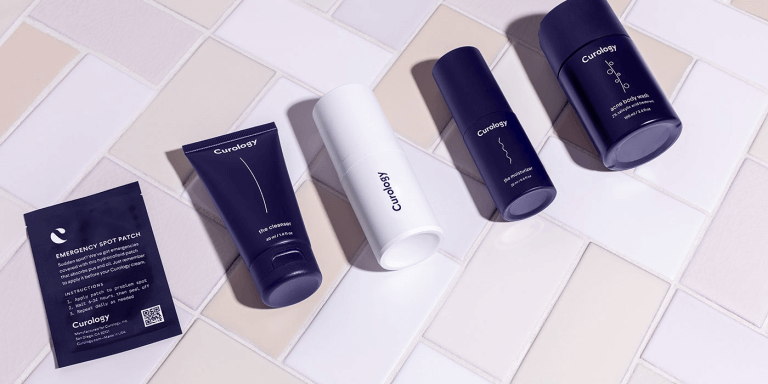How it works:
Share your skin goals and snap selfies
Your dermatology provider prescribes your formula
Apply nightly for happy, healthy skin
How it works:
How it works:
Share your skin goals and snap selfies
Your dermatology provider prescribes your formula
Apply nightly for happy, healthy skin
How it works:
Is retinol safe? Here’s what you should know
Yes! But it’s important to take it slow at first.



Scientists often debate the efficacy of many skincare ingredients, so it’s natural to worry whether they do more harm than good. When it comes to retinol, we’re happy to put your mind at ease.
Retinol is a vitamin A derivative used to treat fine lines, wrinkles, dark spots, and uneven skin tone. It has a rich history in skincare and is one of the industry’s most researched ingredients. Still, retinol gets a bad rap in the beauty industry for causing skin irritation.
So, is retinol safe? Our experts say yes, but there are some essential guidelines to follow. Here we’ll explain retinol and how to use it, then share expert tips to get started with retinol products and avoid “retinol burn.”
Retinol may not be for everyone, but it’s a game-changer for many common skin concerns.
What is retinol for?
Retinol is a type of retinoid, an umbrella term for vitamin A-derivative skincare products.¹ But there is a difference between retinol and prescription retinoids, such as tretinoin, which treats acne and is anti-aging. Retinol has been observed to be 20 times less potent than tretinoin.²
It may not be as strong as prescription alternatives, but retinol still provides powerful benefits. Here are the primary uses:
Treats skin aging:³ Retinol promotes collagen production and improves the thickness of the skin, which helps reduce the appearance of fine lines and wrinkles.⁴
Treats hyperpigmentation: Retinol accelerates skin cell turnover rate, improving dull skin and helping fade dark spots.⁵
Improves skin texture and firmness: Retinol is known to improve skin texture and protect the quality of collagen,⁶ which can ultimately improve firmness.

How to use retinol properly
It can be tempting to purchase a new product and dive right in, hoping to achieve results as quickly as possible. But the secret with retinol is to “start low and go slow.”
Start with a gentle formula. The first time you use retinol, choose a low-strength product. It may take longer to realize results, but it’s still doing its job. Low-strength formulas still accelerate skin cell turnover and boost collagen, just in a much gentler way.
Keep your routine simple. Temporarily stop using any additional products with active ingredients. This will reduce the risk of dryness and irritation.
Apply in a thin layer. Use a dime-sized dab for the face and neck. After cleansing, wait a few minutes for the skin to dry. If retinol is applied to wet or damp skin, it can increase absorption and cause irritation.
Apply a few times a week. Begin by applying two to three times a week, then work up to nightly use over several weeks. The length of this process depends on how quickly your skin adjusts—there’s no hard-set rule.
Apply after moisturizing. Most skincare routines begin with cleansing, followed by treating and then moisturizing. Apply moisturizer before the retinol cream to help minimize irritation during the adjustment period.
Like all retinoids, retinol may cause photosensitivity.⁷ But when used correctly, retinol is safe in the sun. Use retinol in your evening skincare routine and sunscreen in your daytime skincare routine. The American Academy of Dermatology recommends water-resistant, broad-spectrum sunscreen with SPF 30 or higher.⁸
Retinol isn’t one-size-fits-all
Retinol is an effective ingredient, but there may be better choices for people with certain skin conditions. Other beauty products may be better for your skin if you’re experiencing any of these conditions:
Sensitive or dry skin. Retinol causes your skin cells to turnover faster, and this process may irritate sensitive skin and exacerbate dryness. If you’re unsure about how retinol may impact your skin, follow our previous recommendation: Start with low strength and slowly increase use to give the skin time to adjust.
Rosacea. This condition leaves the skin more sensitive and vulnerable to harsh skincare ingredients.
Eczema. Also called atopic dermatitis, eczema causes itchy, dry, and irritated skin. Retinol can increase skin sensitivity, so avoid any patches of skin affected by eczema.
Potential retinol side effects
Retinol is safe for most skin types, but there are some potential side effects, including:
Redness
Burning
Irritation
Increased sensitivity to sunlight
Dry or flaking skin
Mild side effects of retinol are normal and should improve after the adjustment period. Easing into regular use (and applying your retinol at night) is your best defense against side effects. Still, some people will experience an adverse reaction. If side effects don’t improve or are concerning, stop the product you are using and consult your medical provider.
When it comes to whether retinol is safe for pregnancy, like all topical retinoids, retinol should be avoided by those who are trying to get pregnant, pregnant, or nursing. Different anti-aging ingredients, such as moisture-enhancing hyaluronic acids, ceramides, and vitamin C, should generally be safe during that time. However, always review any skin products with your in-person medical provider (preferably your OBGYN) prior to using if you are pregnant or nursing.
Is retinol safe long-term?
Topical retinol has several associated side effects, but it’s widely considered safe for long-term use. One study notes that in young adults no systemic side effects have been observed in the past 30 years with long-term retinoid use.⁹
Although research indicates retinol is typically safe, always use skincare products as directed or recommended by your dermatologist.
How to treat retinol burn
At first, retinol may slough dead skin cells faster than they can regenerate. This results in “retinol burn”—skin irritation caused by the acceleration of the skin cell cycle. This irritation is temporary but further reinforces the importance of easing into retinol use.
Don’t worry if you’re experiencing mild retinol burn; there are ways to mitigate its effects.
Apply a cold compress to soothe the burning sensation. This may provide temporary relief.
Apply a heavy moisturizer, such as Vaseline or the Curology Rich Moisturizer, to the affected area to rehydrate the skin. Emollient-rich lotions and creams help seal in moisture and protect the skin.
Apply moisturizer before applying retinol to minimize irritation. Let the skin dry completely after washing, then apply moisturizer and finish with retinol.
Use a basic three-step skincare routine. Cleanse, treat, and moisturize at night. Cleanse, moisturize, and protect during the day. Use a cleanser designed for your skin type and a hydrating moisturizer. (Don’t forget your lips!)
Skip makeup during the adjustment period. Try tinted sunscreen instead. If you must wear makeup, use micellar water or another gentle makeup remover to avoid further irritation.
Curology can up your retinoid game

Retinol is a great option for signs of aging and other skin concerns, but if you’re looking for a more powerful retinoid, Curology can help.
Our licensed dermatology providers work with you to evaluate your skin and prescribe custom treatments with clinically proven ingredients, such as tretinoin.* Tretinoin is a prescription-strength retinoid that goes beyond treating aging skin; it’s also the gold standard for topical acne treatment.
If you’re looking for a skincare plan that’s just as unique as you, try Curology today. Our dermatology providers customize your treatment plan to tackle your skin concerns, helping you to achieve results quickly and safely.
FAQs
Retinol is a type of retinoid, an umbrella term for vitamin A-derivative skincare products. But there is a difference between retinol and prescription retinoids, such as tretinoin, which treats acne and anti-aging. Retinol has been observed to be 20 times less potent than tretinoin.
It can be tempting to purchase a new product and dive right in, hoping to achieve results as quickly as possible. But the secret with retinol is to “start low and go slow.”
Start with a gentle formula. The first time you use retinol, choose a low-strength product.
Keep your routine simple. Temporarily stop using any additional products with active ingredients.
Apply in a thin layer. Use a dime-sized dab for the face and neck. After cleansing, wait a few minutes for the skin to dry.
Apply a few times a week. Begin by applying two to three times a week, then work up to nightly use over several weeks.
Apply after moisturizing. Most skincare routines begin with cleansing, followed by treating and then moisturizing.
Topical retinol has several associated side effects, but it’s widely considered safe for long-term use. One study notes that in young adults no systemic side effects have been observed in the past 30 years with long-term retinoid use.
P.S. We did the homework so you don’t have to:
American Academy of Dermatology. Retinoid or retinol? (n.d.).
Mukherjee S, Date A, Patravale V, Korting HC, Roeder A, Weindl G. Retinoids in the treatment of skin aging: an overview of clinical efficacy and safety. Clin Interv Aging. (December 2006).
Zasada M, Budzisz E. Retinoids: active molecules influencing skin structure formation in cosmetic and dermatological treatments. Postepy Dermatol Alergol. (2019 August 30).
Mukherjee S, Date A, Patravale V, Korting HC, Roeder A, Weindl G. Retinoids in the treatment of skin aging: an overview of clinical efficacy and safety. Clin Interv Aging. Ibid.
Ortonne, J.P., Retinoid therapy of pigmentary disorders. Dermatologic Therapy. (2006).
Zasada M, Budzisz E. Retinoids: active molecules influencing skin structure formation in cosmetic and dermatological treatments. Postepy Dermatol Alergol. Ibid.
Mukherjee, S., et al. Retinoids in the treatment of skin aging: An overview of clinical efficacy and safety. Clinical Interventions in Aging. Ibid.
American Academy of Dermatology. Sunscreen FAQs. (n.d.).
Mukherjee, S., et al. Retinoids in the treatment of skin aging: an overview of clinical efficacy and safety. Clinical Interventions in Aging. (December 2006).
Laura Phelan is a board-certified Family Nurse Practitioner at Curology. She earned her Masters of Science in Nursing at Benedictine University and went on to get her post-master’s certificate as a Family Nurse Practitioner at the University of Cincinnati.
* Subject to consultation. Subscription is required. Results may vary.

Curology Team

Laura Phelan, NP-C